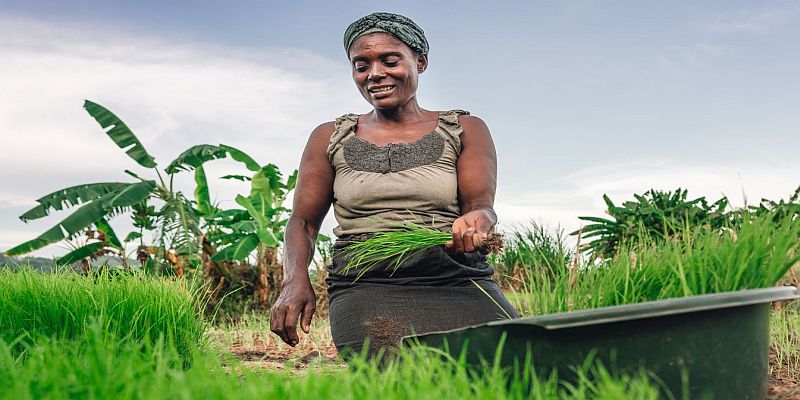CAADP: Setting the Pace for Successful Implementation

I have premised my speech on the tagline “Setting the Pace for Successful Implementation” deliberately, with a view to stimulating debate on how best we can ensure successful implementation of CAADP III. The 4th CAADP Biennial Review undertaken in 2023 noted that “no country was on track to achieve the Malabo targets by 2025.
The continent, as a whole, was not on track with regard to implementing the seven commitments of the Malabo Declaration on Accelerated Agricultural Growth and Transformation for Shared Prosperity and Improved Livelihoods.” The question is, “why are we not able to implement our own commitments to ourselves?” As African countries, we should have deeper reflection on this and I am hopeful that we can identify what we need to do differently in order to ensure successful implementation of CAADP III.
As we step in that direction, let me remind you of this major fact: a population that cannot feed itself cannot guarantee its own future. Therefore, for Africa to guarantee its own future, we must take deliberate steps to feed ourselves. We must also then go beyond feeding ourselves to enabling our people earn incomes and create jobs from the agriculture sector, that is, commercialization and agro-industry.
The theme of our CAADP Strategy and Action Plan 2026 – 35, Building Resilient and Sustainable Agrifood Systems in Africa – says it all. You will note that Agrifood systems encompass interventions in the primary production of food and non-food agricultural products, as well as in food storage, aggregation, post-harvest handling, transportation, processing, distribution, marketing, disposal and consumption.
The second major fact that I will draw your attention to is that implementation of CAADP is primarily at national/Member State level, hence the importance of Member States’ ownership and leadership. Therefore, we as Member States must urgently mainstream CAADP into our National Development Plans, and subsequently Regional Development Plans and Continental Development Strategies and Plans.
At this point, allow me to report that Uganda has already mainstreamed the CAADP Strategy and Action Plan 2026 – 35 into the National Development Plan IV. Mainstreaming CAADP into our development plans provides the framework for resource mobilization (financial and human), both internally and externally; and puts in place the necessary conditions for successful execution.
Similarly, regional collaboration is important. There are key CAADP aspects such as market opening, infrastructure development or pest and disease control that are better managed through inter-country collaboration, hence the need for Regional Economic Communities to play the lead role here.
Continental institutions must play the broader coordination and monitoring role, involving more critical stakeholders at all stages. I was surprised to learn that the 10th – 12th April 2025 Dialogue of Permanent Secretaries of Agriculture was only the fourth since the inception of CAADP in 2003! This leads me to ask: “who, then, has been leading implementation of CAADP at Member States level?”
On a positive note, Dialogue has now been institutionalized and will be held annually. I wish to re-emphasize that the decision should be endorsed at Ministerial level and implemented by the responsible African Union institutions.
The other major aspect that I wish to bring to your attention is the fact that CAADP targets and commitments go beyond the agriculture sector. Sectors such as Infrastructure, Trade, Health, Environment/Climate, among others, have prominent roles to play in delivering on some of the targets. Therefore, inter-sectoral collaboration in-country, at regional level and continental levels is essential. For example, whereas we are talking about fostering intra-African agricultural trade, the agriculture sector is the most heavily protected sector under the African Continental Free Trade Area. The logistics to facilitate this trade are not in the state we would wish them to be. And a number of several other discordant policies and actions.
We must, therefore, foster inter-sectoral collaboration at all levels. The AUC needs to create a platform of all sectors concerned with successful CAADP implementation for harmonization, while we, as Member States, do the same at our level. Each of the African Union Member States has some peculiarities, which must be taken into account in assessing implementation and providing guidance thereto.
Lastly, policy drives everything else. Therefore, for Africa to fully implement CAADP and have it positively contribute to the attainment of the Agenda 2063, we must focus on having the right policies in place and ensuring that they are well executed. Such policies must be coherent.
As I indicated earlier, a population that cannot feed itself cannot guarantee its future existence, hence the need for Africa to prioritize implementation of the CAADP Kampala Agenda. I call for concerted efforts in implementation of the CAADP Kampala Agenda so that we can achieve together as a continent.
By Hon. Kyakulaga Fred Bwino,
Minister of State for Agriculture, Ministry of Agriculture, Animal Industry and Fisheries of the Republic of Uganda/Chair of the African Union Specialized Technical Committee (STC) on Agriculture, Rural Development, Water and Environment (ARDWE)
